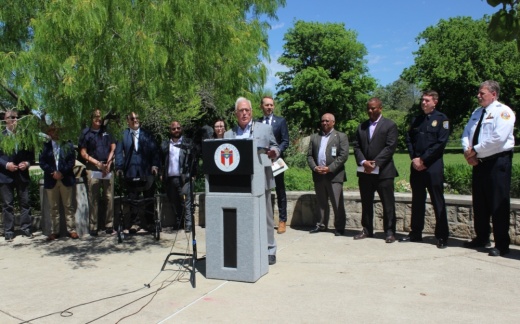Most of Austin and Travis County, and areas to the north and west, fall in the eclipse's path of totality with the chance to see the moon block out the sun for several minutes shortly after 1:30 p.m. The Austin area's status as a prime viewing location for the astronomical event has prompted extensive planning around the arrival of an anticipated 1 million visitors.
“We are not exaggerating in any way when we say this is really a once in a lifetime event for Central Texas," Mayor Kirk Watson said April 2. "Our community has a chance to really view something spectacular, and we want everyone to do that safely, to prioritize their well-being and to know how to prepare.”
What you need to know
Travis County and cities like Dripping Springs have already declared local disasters as a precaution for the event and the crowds it will draw. Local governments, state agencies and other entities are also readying for April 8 and advising those in the area to stay safe and know what to expect on what will likely be a busy day.
Brad Wheelis, Southwest communications director for the Texas Department of Transportation, said the highway department expects "substantial" traffic on major Austin-area thoroughfares, and along the entire path of totality statewide from the southern border to Northeast Texas. TxDOT crews will be monitoring and responding to any major traffic incidents during the event.
Wheelis advised that Austin's main corridors could hit "gridlock" and that traffic on roadways across the Hill Country could also reach a standstill. He and local leaders said those hitting the roads to view the eclipse should use common-sense judgement to give themselves plenty of time for getting to or from a viewing area—or consider staying home if possible.
“We want everybody in the area to have a great time, to come visit Austin and Travis County, but we also want them to be safe and manage their expectations regarding travel and traffic in the area on April 8," Travis County Judge Andy Brown said. "The bottom line is be early, or plan to be late.”
Ken Snipes, Austin's director of emergency management, said the eclipse's tourism impact could be similar to the busiest times around spring festival weekends and major Formula 1 races.
Aside from the celestial event, he noted Austin will also be home to the Rosedale Ride, an Austin FC match, the Statesman Capitol10K and the 2024 CMT Music Awards. Snipes said downtown hotel occupancy is now at 77% for April 6-8 with rates that are nearly 50% higher than the same time last year.
He and other leaders said they don't believe the region will face a shortage of gas, food and other essentials before or after the eclipse. Nevertheless, they said said residents could take time to refuel and run errands early as a precaution.
Snipes also said the large number of people could hamper cell service around Austin. If that is the case, officials said residents should try texting if phone calls aren't connecting, including for 911.
Recommended preparations extend to Central Texas visitors as well.
The Federal Aviation Administration has warned that Austin-Bergstrom International Airport, along with dozens of airports nationwide, could experience a variety of disruptions around the event.
ABIA spokesperson Sam Haynes said those traveling by air should plan for delays following the eclipse April 9. She also said ABIA rental car agencies are fully booked during the eclipse and could reach capacity April 9 due to vehicle returns from around the region—a situation that could lead to further delays for those arriving at the airport.
"We are asking everyone to expect impacts," Snipes said.
What else?
As of April 2, clear skies and favorable viewing conditions are not in the forecast for the eclipse April 8—although the weather has the potential to change, National Weather Service meteorologist Paul Yura said.
Jessica Gilzow, culture and arts director for the Austin Parks and Recreation Department, said those around Austin should still experience some of the eclipse's effects even if the event is obscured by clouds or rain. Skies will darken, and temperatures could drop as much as 15 degrees during totality, she said.
Anyone hoping to view the eclipse should not look directly at the sun without protective eyewear. Eclipse glasses are being distributed around the area, including at Austin Public Library facilities beginning April 4 while supplies last. Several APL branches will also be hosting events leading up to and during the eclipse.
Austin and Travis County officials invited residents and tourists to visit park facilities for viewing. The city and The University of Texas are also partnering to host pop-ups with special telescopes in every City Council district.
More information on preparing and viewing the eclipse is available online from the city, county and library system.





